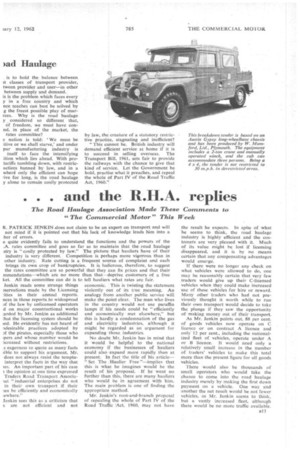. . and the R.H.A. replies
Page 45

If you've noticed an error in this article please click here to report it so we can fix it.
The Road Haulage Association Made These Comments to "The Commercial Motor" This Week
R. PATRICK JENK1N.does not claim to be an expert on transport and will not mind if it is pointed out that his lack of knowledge leads him into a ber of errors.
e quite evidently fails to understand the functions and the powers of the A. rates committee and goes so far as to maintain that the •road haulage stry is cosily protected by law." The picture that hauliers have of their industry is very different. Competition is perhaps more vigorous than in other industry. Rate cutting is a frequent source of complaint and each brings its own crop of bankruptcies. It is ludicrous, therefore, to suggest the rates committee are so powerful that they can fix prices and that their mmendations—which are no more than that—deprive customers of a free ket. All the committee can do is to tell hauliers what rates are fair.
Jenkin reads some strange things )servations made by the Licensing :ities in their annual reports. nces in those reports to widespread at the Jaw by unlicensed operators d on major constructional works Arded by Mr. Jenkin as additional that the licensing system should be Led. He evidently has not heard of adesirable practices adopted by A the pirates, especially those who opens and whose number would be acreased without restrictions.
.s eagerness to quote as many facts ;ible to support his argument, Mr. does not always resist the temptainterpret the facts in the way that les. An important part of his case the opinion at one time expressed Traders Road Transport Associalat "industrial enterprises do not in their own transport if their an be efficiently and economically iewhere."
Jenkin sees this as a criticism that s are not efficient and not economic. This is twisting the statement violently out of its true meaning. An analogy from another public service will make the point clear, The man who lives in the country would not use paraffin lamps if his needs could be "efficiently and economically• met elsewhere," but this is hardly a condemnation of the gas and electricity industries, although it might be regarded as an argument for expanding those industries.
No doubt Mr. Jenkin has in mind that it would be helpful to the national economy if the businesses of hauliers could also expand more rapidly than at present. • In fact the title of his article" Set The Haulier Free "—implies that this is what he imagines would be the result of his proposal. If he went no further than this, there are many hauliers who would be in agreement with him. The main problem is one of finding the appropriate method.
Mr. Jenkin's root-and-branch proposal of repealing the whole of Part IV of the Road Traffic 'Act, 1960, may not have the result he expects. In spite of what he seems to think, the road haulage industry is highly efficient and the customers are very pleased with it. Much of its value might he lost if licensing disappeared, and it is by no means certain that any compensating advantages would emerge,
If there were no longer any check on what vehicles were allowed to do, one may be reasonably certain that very few traders would give up their C-licensed vehicles when they could make increased use of these vehicles for hire or reward. Many other traders who had not previously thought it worth while to run their own transport would decide to take the plunge if they saw the opportunity of making money out of their transport.
As Mr. Jenkin points out, 88 per cent. of goods vehicles now operate on C licence or on contract A licence and only 12 per cent., including the nationalized fleet of vehicles, operate under A or B licence. It would need only a relatively small increase in the number of traders' vehicles to. make this total more than the present figure for all goods vehicles.
There would also be thousands of small operators who would take the chance to come into the road haulage industry merely by making the first down payment on a vehicle. One way and another the net result would be not fewer vehicles, as Mr. Jenkin seems to think, but a vastly increased fleet, although there would be no more traffic available.








































































































































